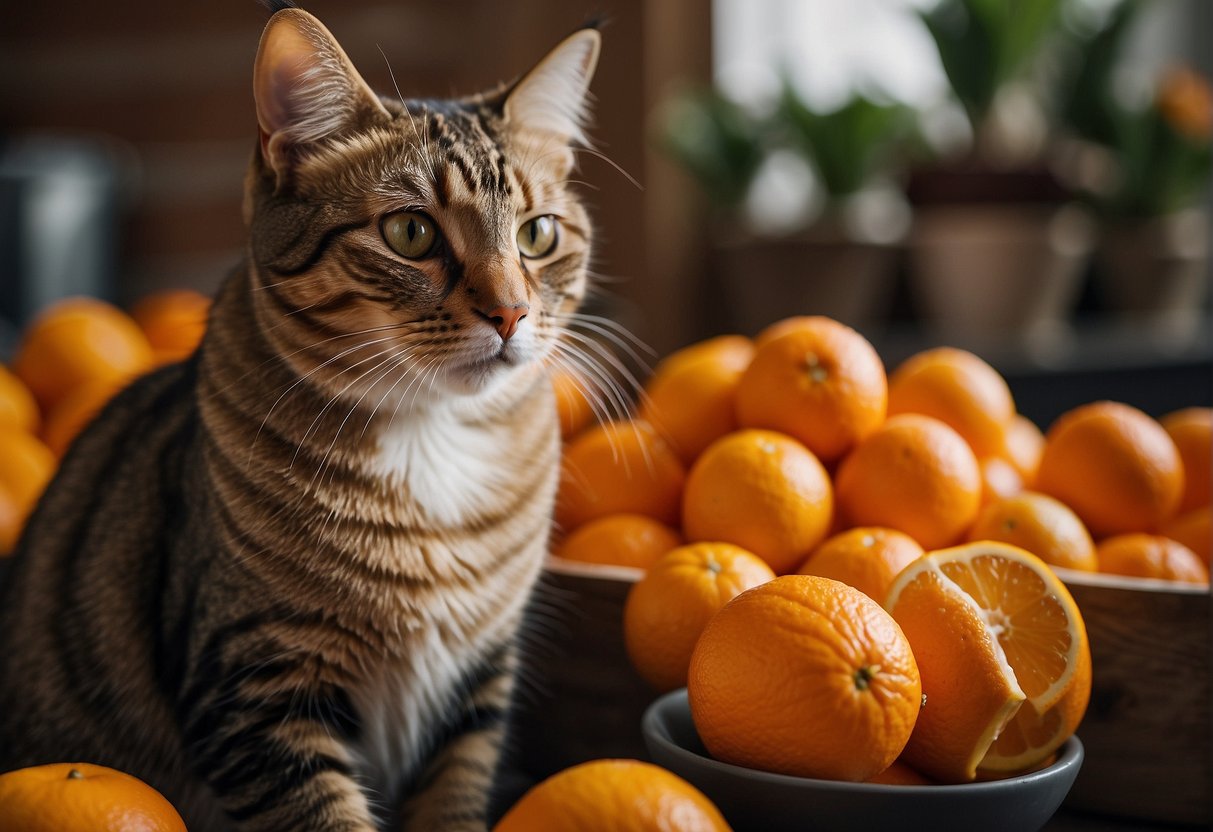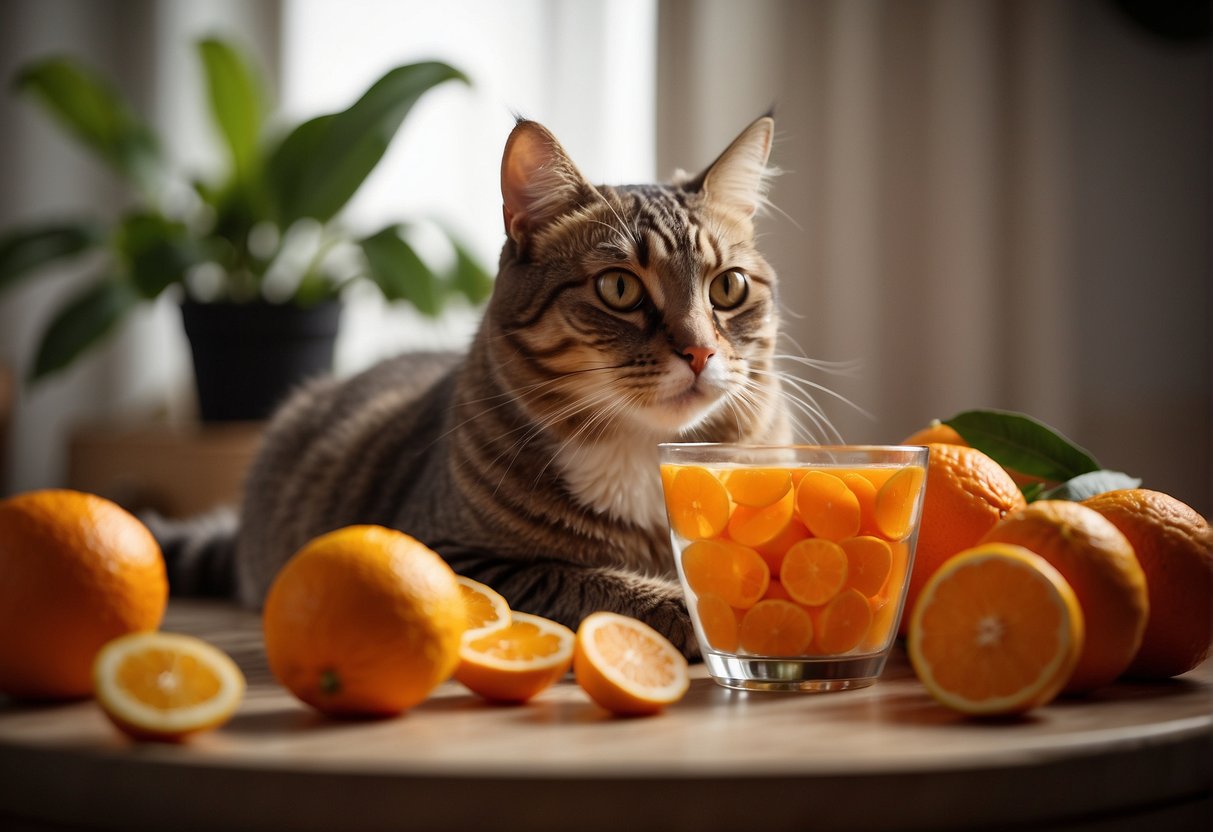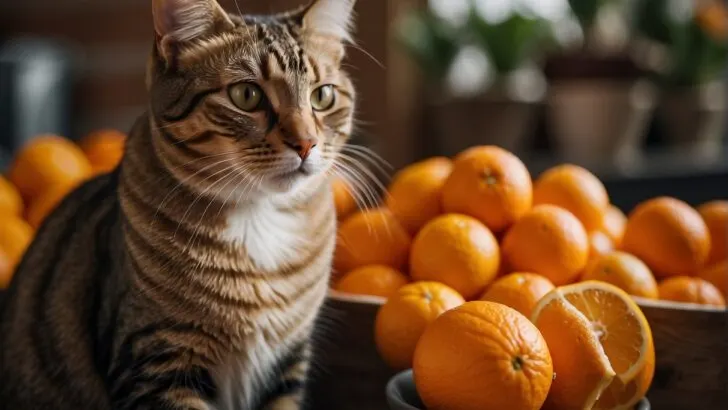Cats naturally produce vitamin C within their bodies, so they generally do not require a dietary supply of this vitamin. Your feline friends make enough of this essential nutrient on their own to maintain health, which is something not all animals can do.
For example, after a buddy of mine adopted two kittens from a shelter, they found they were lively and robust without any added vitamin C in their diet, just the balanced feline nutrition provided in their food.

With that said, Vitamin C is crucial for the growth, development, and repair of tissues and is involved in the production of collagen, which aids in healing wounds.
But unlike humans, who must obtain vitamin C from their diet, cats synthesize it internally.
Remember when your kitty had that little scrape from climbing too ambitiously? They bounced back quickly without any extra help from vitamin C supplements—evidence of their body’s natural healing process at work.
Vitamin C Essentials for Cats
Vitamin C plays a unique role in the health and well-being of your cat, even though their bodies handle it differently than ours.
Understanding Vitamin C in Felines
Unlike humans, cats naturally synthesize ascorbic acid, commonly known as vitamin C, in their liver. Therefore, supplementation is not typically necessary for their diet. This capability distinguishes them as exceptional among many carnivores.
Even so, vitamin C remains a vital, water-soluble antioxidant that’s crucial for a cat’s overall health.
| Function: | Contribution of Vitamin C: |
|---|---|
| Antioxidant Properties | Neutralizes free radicals, reducing oxidative stress. |
| Collagen Synthesis | Essential for maintaining skin, blood vessel, and bone health. |
| Immune System | Supports the immune system’s ability to combat pathogens. |

As a result, even though cats produce their own vitamin C, ensuring that your cat’s own production is not disrupted remains an important consideration for their care.
Vital Functions of Vitamin C
Vitamin C, while naturally produced by your cat, has several important roles to play:
- Antioxidant: It’s akin to a bodyguard for cells, protecting them from oxidative damage caused by free radicals. This is paramount in maintaining long-term health and is especially beneficial in conditions where your cat might be under increased stress or is older.
- Collagen: For the adventurous climber or the agile jumper that your cat may be, vitamin C is integral in collagen production. This sturdy protein is the cornerstone of skin, tendons, ligaments, and blood vessels—all critical for your cat’s acrobatic talents.
- Immune System: Just like us, cats benefit from an immune system that’s robust and ready to tackle invaders. Vitamin C contributes to this defensive lineup, ready to support your cat whenever it faces health challenges.
While cats have their own system to manage vitamin C, as a devoted cat companion, it’s essential to monitor their overall diet and health, ensuring they have what they need to continue thriving.
A well-rounded diet, typically achieved through high-quality commercial cat foods, is sufficient to maintain these systems without the need for additional supplements.
Cats’ Dietary Requirements
When it comes to your feline friend’s nutrition, understanding what they need to thrive is key.
Do Cats Need Vitamin C Supplements?
Cats synthesize their own vitamin C (ascorbate), so generally, they do not need vitamin C supplements. Their liver can produce enough ascorbate to fulfill their normal requirements.
However, like any nutrient, the need for vitamin C may vary based on individual health conditions.
- Natural Sources: A cat’s diet usually provides what they need. Natural sources include fresh meat and fish.
- Supplementation: Not typically necessary; consult a veterinarian first if you think supplementation might be required.
- Considerations: Only consider supplements if advised by your vet, for example in cases of disease or stress.
Identifying Deficiencies and Excess
Recognizing the signs of both deficiencies and excess is vital for maintaining your cat’s health.
- Deficiencies: Rare but possible, often due to underlying health conditions, not lack of dietary intake.
- Excess: More common than deficiencies; signs can include diarrhea or possible toxicity.
- Monitoring: Watch for unusual symptoms and consult your vet if you’re concerned about your cat’s health.
- Balance is Key: Moderation is essential, as too much of any mineral or nutrient can cause imbalances.
Health Benefits and Risks
When considering vitamin C for your feline companion, it’s essential to understand both the potential benefits and risks associated with this vitamin, especially given its role in supporting several critical bodily functions and its strength as an antioxidant.
Supporting Growth and Repair
Your cat’s body utilizes vitamin C to synthesize collagen, a fundamental component of connective tissues. This is vital for your pet’s growth, as well as repair of wounds.
Though cats naturally produce vitamin C in their liver, ensuring they have a healthy diet can support these processes. So in some rare cases you may want to administer them some supplements with the approval of your vet.
Strengthening the Feline Immune System
Vitamin C bolsters the immune system, helping your kitty fend off various infections, viruses, and bacteria. It can act as an antioxidant, protecting against oxidative damage.
For cats with compromised health, like those with feline immunodeficiency virus, managing overall immune health is even more crucial.
Addressing Feline Ailments
In certain scenarios, vitamin C may help manage specific health issues. For example, it has anti-inflammatory properties which can aid in conditions like arthritis.
Additionally, it can be involved in the prevention of urinary tract issues, including bladder stones and urinary crystals, as well as support liver health..

My name is James, and welcome to FAQCats!
Along with our team of cat owners, expert pet enthusiasts, and pet professionals, we aim to write engaging helpful, engaging content about cats. At FAQCats we strive to provide content that’s accurate and fun to read. Our team writes about everything related to cats; even the most complex of topics. Through extensive research and caring for our own fur-pals, we’re able to provide something cat owners worldwide will love. Have a look around, and leave us feedback anytime!

